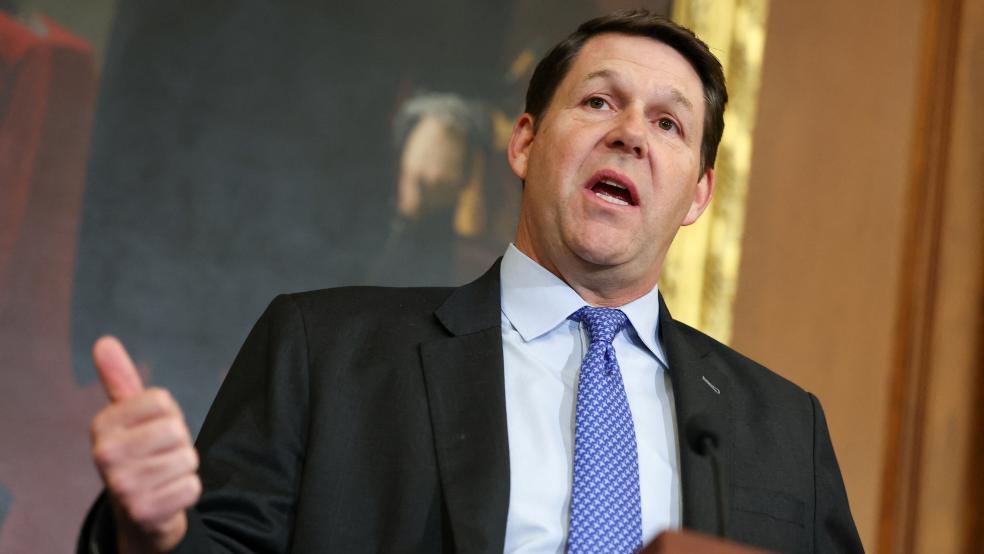Even as Congress tries to wrap up the drawn-out appropriations process for the 2024 fiscal year, which started back in October, lawmakers are also eager to turn the page to the 2025 budget. That process kicks off this month with President Joe Biden expected to release his request next week. House Republicans released their own budget resolution this week, and they passed it through the House Budget Committee after a markup hearing on Thursday.
An overview of the Republican plan: Republicans, led by Budget Committee Chair Jodey Arrington of Texas, say their plan balances the federal budget in 10 years, resulting in a budget surplus in 2034, and would reduce deficits by a total of $14 trillion over the coming decade. They insist they can achieve those savings through spending cuts and rosy projections of 3% annual economic growth, higher than other forecasts — and without cuts to Medicare, Social Security and veterans’ benefits. They would still have a bipartisan fiscal commission propose ways to preserve those programs while also addressing their long-term financial imbalances.
“Our deficit spending is out of control, our national debts are unsustainable, and the fiscal state of the Union is in rapid decline,” Arrington said in opening remarks at the hearing. “Today, while President Biden talks about the State of the Union, Republicans on the Budget Committee today here in this room are taking action to revive the fiscal state of our union by passing our fiscal year ‘25 budget resolution, a budget blueprint to restore fiscal responsibility by reining in spending, reigniting economic growth and putting our nation on a path to balance.”
Democrats warn of colossal cuts: Democrats countered that the GOP plan sells out American families by making huge cuts to crucial programs, including Medicare and Medicaid, all to protect the wealthy and corporate interests. “This MAGA budget is an assault on everything from health care to education. It would strip funding for food assistance for those in need, attack Medicaid, and make indiscriminate cuts to many government programs upon which Americans rely,” said Rep. Brendan Boyle of Pennsylvania, the top Democrat on the panel. “Whether it's making it harder to put food on the table or keep shelter over your head, this budget does plenty of harm, and it does this all while paving the way for an extension of the Trump tax cuts, 83% of which went to the richest 1%.”
Boyle also warned that the Republican budget only balances because of overly optimistic economic assumptions: “even after trillions of dollars in draconian cuts they make to programs that help the most in need, this Republican budget still doesn't balance. In order to achieve that, they jettisoned the assumptions of the nonpartisan Congressional Budget Office and other reputable sources to rely on astonishing predictions of economic growth that somehow creates three extra trillion dollars out of thin air.”
What budget watchdogs say: The Committee for a Responsible Federal Budget, a nonprofit that advocates for deficit reduction, lauded Arrington for issuing a budget plan and doing it ahead of schedule, calling it a basic but important step.
“This budget includes many important objectives such as improving our fiscal trajectory, specific reforms to lower and equalize Medicare payments, acknowledgment that continuation of expiring tax cuts should be designed to be deficit neutral, calls to improve the budget process and reduce gimmicks, and a bipartisan fiscal commission,” CRFB President Maya MacGuineas said in a statement.
But, she added, the plan is unrealistic. “The goal of reaching a balanced budget in ten years is completely unrealistic and counterproductive by perpetuating the myth that that is plausible. To get there, this budget combines genuine savings, which we applaud, along with large unspecified cuts — including to appropriations and improper payments — which will almost certainly not materialize. Aggressive assumptions about economic growth account for more than one-fifth of its savings. And while it is good that the budget calls for deficit-neutral tax policy rather than tax cuts, it lacks specifics on how expensive tax cut extensions will be offset.”
The bottom line: House Republicans have laid down a marker. Biden’s budget is expected to be released on Monday. We’re not quite done with 2024 appropriations, but the 2025 budget season is heating up.





